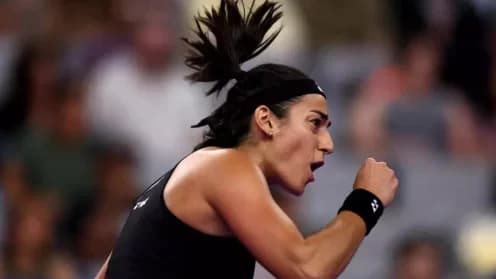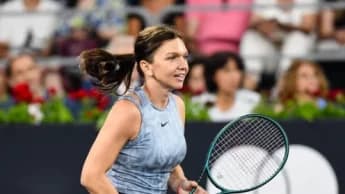WTA Finals in Saudi Arabia: Catalyst for Change or PR Move?

"Amidst the grandeur of the WTA Finals in Riyadh, a complex narrative unfolds—balancing sporting triumph with pressing human rights concerns, as global attention shifts towards the transformative power of women's tennis in challenging cultural norms."
The Women’s Tennis Association (WTA) Finals taking place in Riyadh signify a groundbreaking moment in Saudi Arabia’s ambitions to establish itself as a significant force in international sports. This marks the first time the kingdom is hosting this esteemed event, drawing the world's top eight female singles and doubles competitors. However, with a staggering prize pool of $15.25 million, the tournament is more than just a sporting event; it stands as a profoundly intricate and contentious cultural moment that has ignited discussions within and outside the tennis community. Central to this discourse is the question: Can sports, especially women’s sports, serve as a driving force for transformation in a nation with a concerning human rights history?
Coco Gauff, the youngest participant at the Finals, has been particularly outspoken regarding the issue, highlighting the ongoing human rights issues that have plagued Saudi Arabia for years. Renowned for her level-headedness both on and off the court, Gauff voiced her initial doubts about competing in a nation where homosexuality is criminalized, women's rights are restricted, and freedom of expression is suppressed. Nevertheless, Gauff decided to participate, acknowledging the potential of sports to drive social change. She entrusted the WTA and the Saudi Tennis Federation's assurances that the event could serve as a force for good.
“This is just the beginning,” Gauff remarked. “Change happens gradually, and I’m optimistic that we will witness genuine progress as time goes on.” Her hopeful outlook mirrors a wider feeling shared by many athletes who recognize the shortcomings of the country but believe that their involvement could help drive positive change.
Yet, the debate over whether this signifies true progress or a strategic public relations tactic — commonly known as 'sportswashing' — continues to be fiercely examined. For individuals like Fawzia al-Otaibi, whose sister Manahel is incarcerated for championing women's rights, the WTA Finals symbolize a troubling misuse of sport to obscure the nation’s poor human rights record. 'I view these athletes not as victims, but as complicit actors,' al-Otaibi remarked, voicing the discontent shared by many advocates for human rights.
While tension surrounds the tournament, the players appear to feel emboldened to express their views. In various interviews, they shared a range of perspectives regarding Saudi Arabia's impact on their careers. For instance, World No. 2 Iga Swiatek praised the event's grandeur, calling the facilities at King Saud University 'incredible' and offering no complaints about the organization of the event — a stark contrast to the disarray experienced during last year's tournament in Cancun.
“Everything appears to be quite impressive here,” remarked Aryna Sabalenka, the world No. 1, reflecting Iga Swiatek’s approval of the event’s organization. Yet, beneath these positive remarks lies a sense of ambivalence, as players like Gauff recognize the long-term consequences of their participation in a country with such a contentious history. They believe the possibility for change may outweigh the unease associated with competing in a setting that does not align with Western ideals concerning human rights.
Judy Murray, serving as the WTA's ambassador in Saudi Arabia, adopts a somewhat different perspective. Though she was initially unsure, Murray now advocates for tennis as a means of driving change. She is focused on establishing grassroots tennis initiatives for women in schools across Saudi Arabia, highlighting the potential of the sport to empower individuals. 'This is a tremendous opportunity,' she noted, referencing the larger goal of fostering enduring societal transformation. 'By the conclusion of year three, I am hopeful that we will find ourselves in a significantly improved situation.'
The push for women’s sports in Saudi Arabia is more than just a top-down effort. Local women are being engaged in tennis through clinics and community initiatives, with some already making a significant impact on the lives of young girls like 15-year-old Zaina. 'Having the opportunity to participate in these tournaments is transformative,' she remarked, embodying the aspirations of a generation eager to overcome the limitations that have traditionally restricted women from various aspects of public life.
However, in spite of these initiatives, human rights issues continue to be a concern. The kingdom's ambitious 'Vision 2030' agenda, which aims to establish Saudi Arabia as a center for global sports events, hints at meaningful societal changes. Nonetheless, critics maintain that without substantial reforms, these efforts may be seen merely as superficial attempts by a regime keen on enhancing its international reputation, all while failing to tackle the deep-rooted problems within its borders.
For the WTA, the event is a careful balancing act. The prize pool is unmatched, and the caliber of women’s tennis showcased is exceptional. However, such a prominent platform invites significant scrutiny. Iconic figures like Martina Navratilova and Chris Evert have criticized the choice to host the WTA Finals in Saudi Arabia, arguing that the country’s repressive regime is at odds with the values of women's sports.
Ultimately, the crucial question persists: Is this a sincere effort to empower women and promote social progress, or is it merely a profitable yet fundamentally flawed display for a nation striving to enhance its reputation while neglecting uncomfortable realities?
As the WTA Finals progress, the spotlight of the sports community is on Riyadh, where tennis transcends mere gameplay—it is becoming a significant part of a broader discussion regarding global ideals, human rights, and the authentic influence of sports. It remains to be seen if Saudi Arabia can fulfill its commitments to change, but one thing is clear: the repercussions of this event will reach far beyond the courts of King Saud University.






